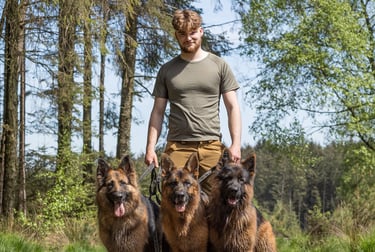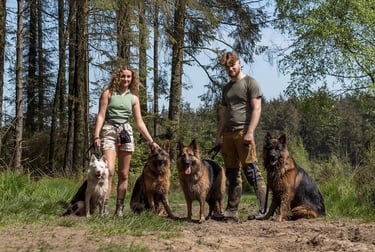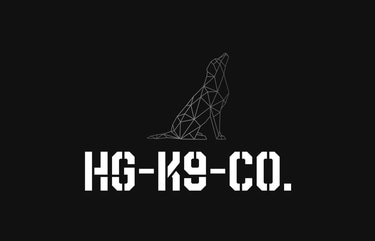Why You Should See a Professional if your dog is Reactive
Written by Jack Smithson, head trainer at HGK9CO, Harrogate K9 Company. Offering Dog Walking & Daycare in Harrogate and Dog & Puppy Training in Harrogate & North Yorkshire.
Why You Should See a Professional if Your Dog is Reactive
If your dog is reactive, whether they’re barking at other dogs, lunging at people, or getting overly anxious in certain situations, it can be incredibly frustrating for both you and your pet. Reactive behaviour is a sign that something isn't quite right, and while you might think you’re helping your dog by trying to correct the behaviour yourself, there’s a chance you could be making the situation worse without even realising it.
Here’s why it’s crucial to seek professional help when dealing with a reactive dog.
1. You Might Be Accidentally Praising the Wrong Behaviour
Many dog owners unknowingly praise or reinforce reactive behaviour, thinking they’re helping their dog calm down. For example, when your dog is barking at another dog or person, you might comfort them by saying “It’s okay” or petting them to reassure them. While this might feel like you’re offering support, you could actually be reinforcing the behaviour you're trying to stop.
Dogs learn through association, and by giving attention or comfort during moments of reactivity, you may be unintentionally teaching them that the reactivity is an acceptable way to get attention. Instead of calming your dog, this reinforces the fear or anxiety that led to the reactive behaviour in the first place.
A professional dog trainer can help you understand the right way to react to your dog’s behaviour. They’ll teach you how to reinforce calmness and how to manage your dog’s emotions properly, avoiding the inadvertent reinforcement of undesirable behaviour.
2. You Could Be Training Your Dog to React Without Realising It
Another key reason to see a professional is that you may inadvertently be training your dog to react more intensely to certain triggers. For example, if your dog starts lunging at other dogs on walks, and you try to correct it by pulling them away or using harsh methods, you may end up making your dog more anxious and heightening the reaction.
Every time a dog reacts, their brain reinforces that behaviour. This can lead to a vicious cycle where the reactivity gets worse over time. Without the right approach, your dog could learn that reacting aggressively is the way to deal with their feelings, which can make the situation harder to manage in the future.
A professional trainer can break this cycle by using positive reinforcement techniques and introducing desensitisation. With the right training, you can help your dog learn how to stay calm in stressful situations, without inadvertently making their reactivity worse.
3. The Behaviour Could Be Getting "Distilled" into Their Brain
Dogs, like humans, form neural pathways in their brains that reinforce certain behaviours. When your dog consistently reacts in a certain way—whether that’s barking, lunging, or growling—the brain starts to “distill” that behaviour, making it more automatic and harder to change. In other words, the longer the behaviour persists, the more difficult it will be to fix.
Reactivity can become a deeply ingrained habit, and over time, it becomes more challenging to address without professional intervention. A professional dog trainer has the skills to intervene early, break down the learned behaviours, and redirect your dog’s attention towards more positive responses. Through carefully structured training, a professional can help “rewire” your dog’s brain and reduce the intensity of the reactive behaviour.
4. You Need an Objective, Experienced Eye
When it comes to reactive dogs, emotions can run high, and it’s easy to feel frustrated or overwhelmed. You might feel like you've tried everything, or even that your dog will never change. This is where a professional can make a huge difference.
A dog trainer has the experience and expertise to assess your dog’s behaviour from an objective point of view. They can identify the underlying causes of the reactivity, whether it’s fear, anxiety, or frustration, and develop a tailored training plan to address these issues. Additionally, trainers can spot small cues or signs of stress that you might miss, ensuring a more holistic approach to behaviour modification.
5. Early Intervention Can Prevent Bigger Problems
The earlier you address reactivity, the better. Left unchecked, reactive behaviour can escalate into more serious issues, such as aggression. If your dog’s reactivity is not addressed early on, it can lead to problematic behaviours that may be harder to manage as time goes on.
By seeking professional help early, you not only improve your dog’s behaviour but also prevent potential future issues. A professional trainer can provide you with the tools to manage reactivity before it becomes a bigger problem, setting you and your dog up for long-term success.
Conclusion: Don’t Wait – Seek Help Early
If your dog is reactive, it’s important to recognise that this is not something you should have to handle alone. Seeking professional help ensures that you’re using the right techniques, preventing further reinforcement of the reactivity, and setting your dog up for success. With the guidance of a professional, you can help your dog manage their reactions, build confidence, and ultimately live a more relaxed, enjoyable life.
Social Media
Get in touch today to change your dog's life, forever.




